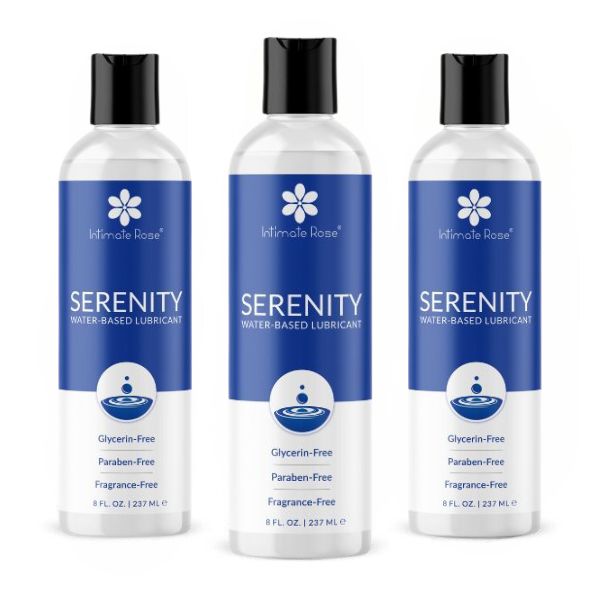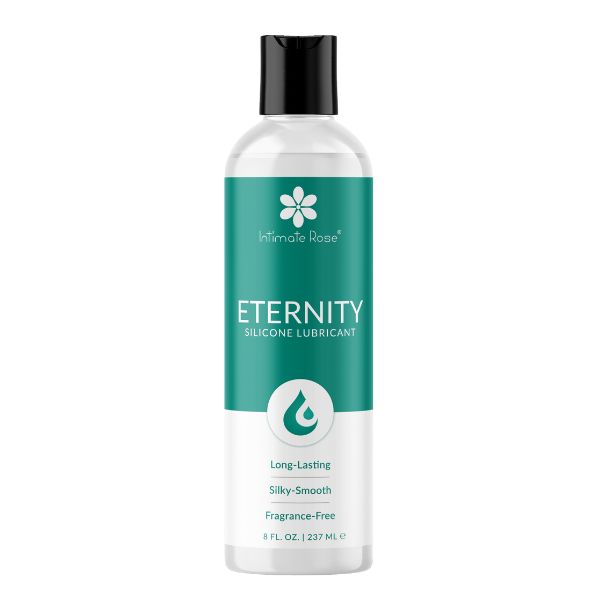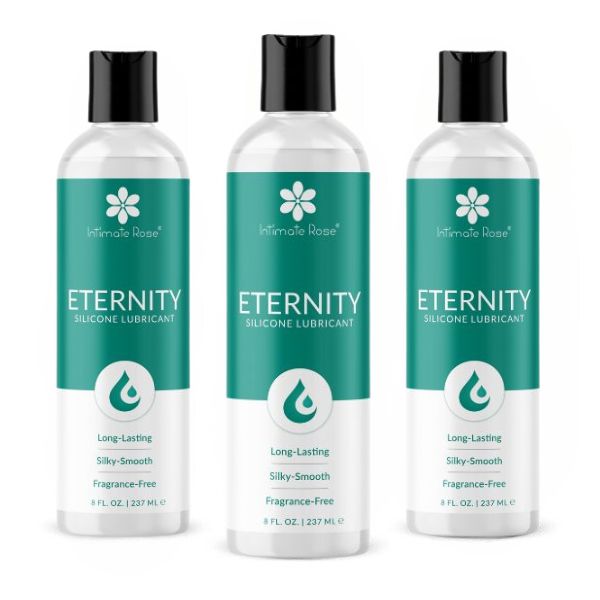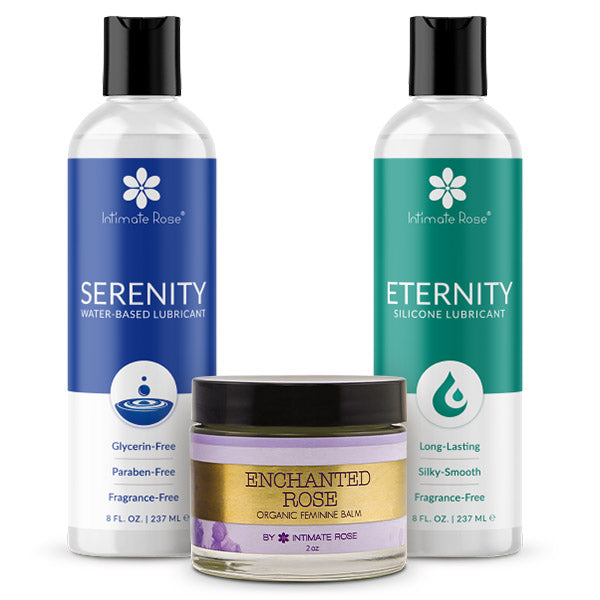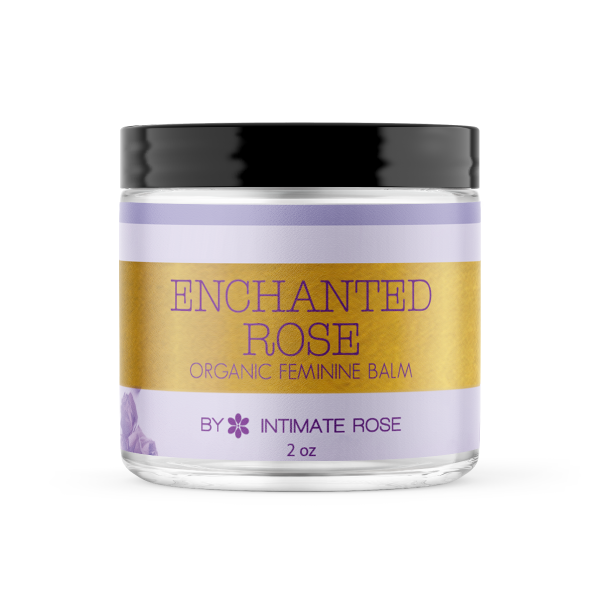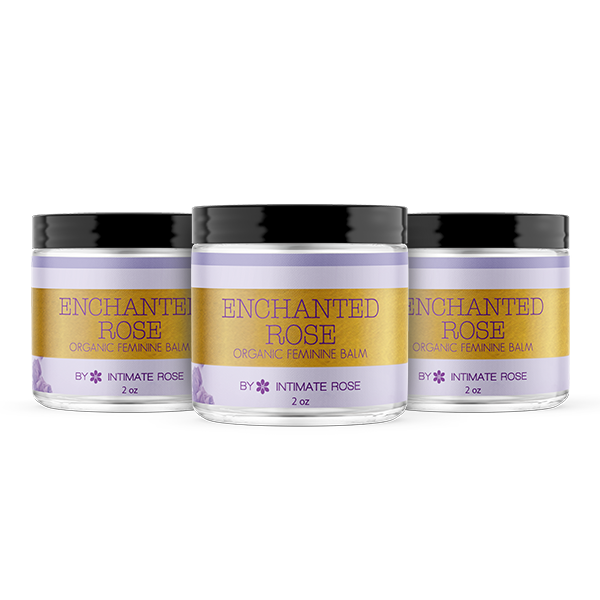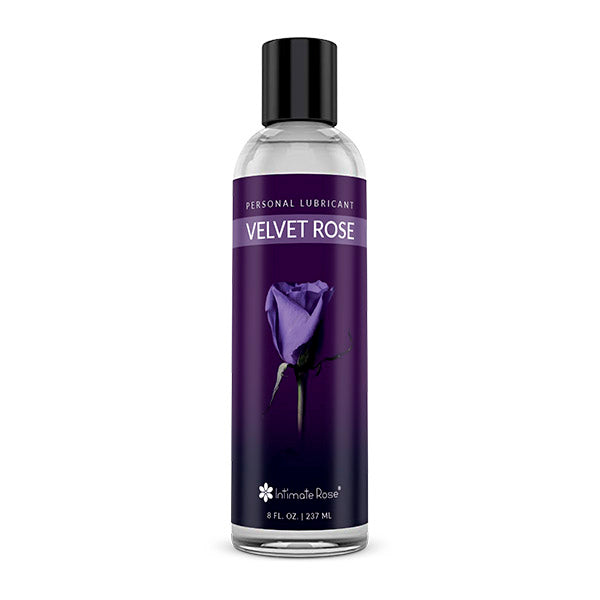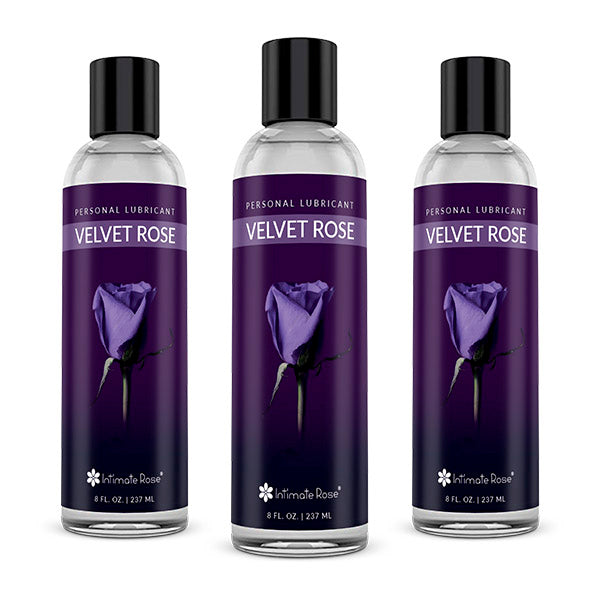As if the menopause rollercoaster wasn't exciting enough, many women find themselves dealing with an unexpected plus-one: recurring UTIs.
But before you start cursing your bladder for joining forces with your hormones, let's dive into why this dynamic duo might be causing you more bathroom trips than you'd like.
Urinary Tract Infection (UTI): What is It?
UTI refers to an infection of the urinary tract, which includes the bladder, kidneys, ureters, and urethra. UTIs typically begin in the urethra when bacteria from the surrounding area and rectum are spread to the vagina. The presence of this bacteria upsets the natural balance of the vaginal microbiome and causes an infection.
UTI Symptoms
In addition to the frequent and often urgent need to urinate, women with a UTI can experience additional symptoms, such as:
- Pain, burning, or stinging when urinating
- Feeling the need to urinate even when the bladder is empty
- Only a few drops of urine at a time
- Low abdominal pain
- Dark urine with a strong odor
- Urine may contain some blood
Back pain, fever, confusion, nausea, and vomiting usually indicate the infection has spread to the kidneys. In these cases, it’s imperative to seek medical care.
UTIs and Menopause: What’s the Connection?
As estrogen levels drop during perimenopause, symptoms like irregular menstruation, mood swings, hot flashes, insomnia, low libido, heart palpitations, and joint pain can arise. Genitourinary syndrome of menopause (GSM) can also occur, which refers to any vulval, vaginal, or urinary symptoms associated with perimenopause and menopause. These can include UTIs, vaginal dryness, and pain during sex (dyspareunia).
In the vaginal microbiome, where a delicate balance of friendly and harmful bacteria keeps the vagina healthy and infections at bay, declining estrogen levels can reduce the presence of friendly bacteria known as lactobacilli. Lactobacilli are required to destroy harmful bacteria like E. coli, which are the bacteria that cause UTIs, so when lactobacilli levels are low, UTIs can occur more frequently.
Low estrogen levels also thin the vaginal walls during perimenopause and menopause, which further contributes to an ideal environment for harmful bacteria like E. coli to thrive and cause UTIs.
With the continuing reduction of estrogen production throughout perimenopause, the pelvic floor and bladder muscles are also known to weaken. Although this often results in menopausal urinary incontinence, the weak bladder and pelvic floor muscles can also contribute to UTIs if the bladder is not fully emptied during urination.
In addition to thinning the vaginal walls, low estrogen levels during perimenopause and menopause can also thin the vulva and labia (outer vagina). The discomfort or pain of thinner labia can result in women changing their wiping habits after using the toilet, which can lead to more frequent UTIs.
In conjunction with the effects of low estrogen, the risk of UTIs increases in menopausal women who are sexually active.
Treating UTIs In Menopause
Due to lowered estrogen levels, UTIs and recurring UTIs are more common during perimenopause and menopause. In comparison to 20-36% of premenopausal women experiencing recurring UTIs, for example, the recurrence is as high as 55% in menopausal women.
To treat the effects of lowered estrogen during perimenopause and menopause women are primarily advised to supplement estrogen – either through estrogen therapy or by taking phytoestrogens.
Estrogen Therapy
Estrogen therapy is a form of hormone replacement therapy, but rather than include both estrogen and progestin, it contains only estrogen. To relieve the symptoms of recurring UTIs and other GSM symptoms in menopause, topical or vaginal estrogen is often recommended. This is usually administered directly into the vagina as a cream, oil, or estrogen ring.
Some women prefer the natural alternative of phytoestrogens to hormonal therapy. It is always a good idea to discuss with your physician what your individual risk factors and desires are.
Hormonal and Non Hormonal Menopause Relief
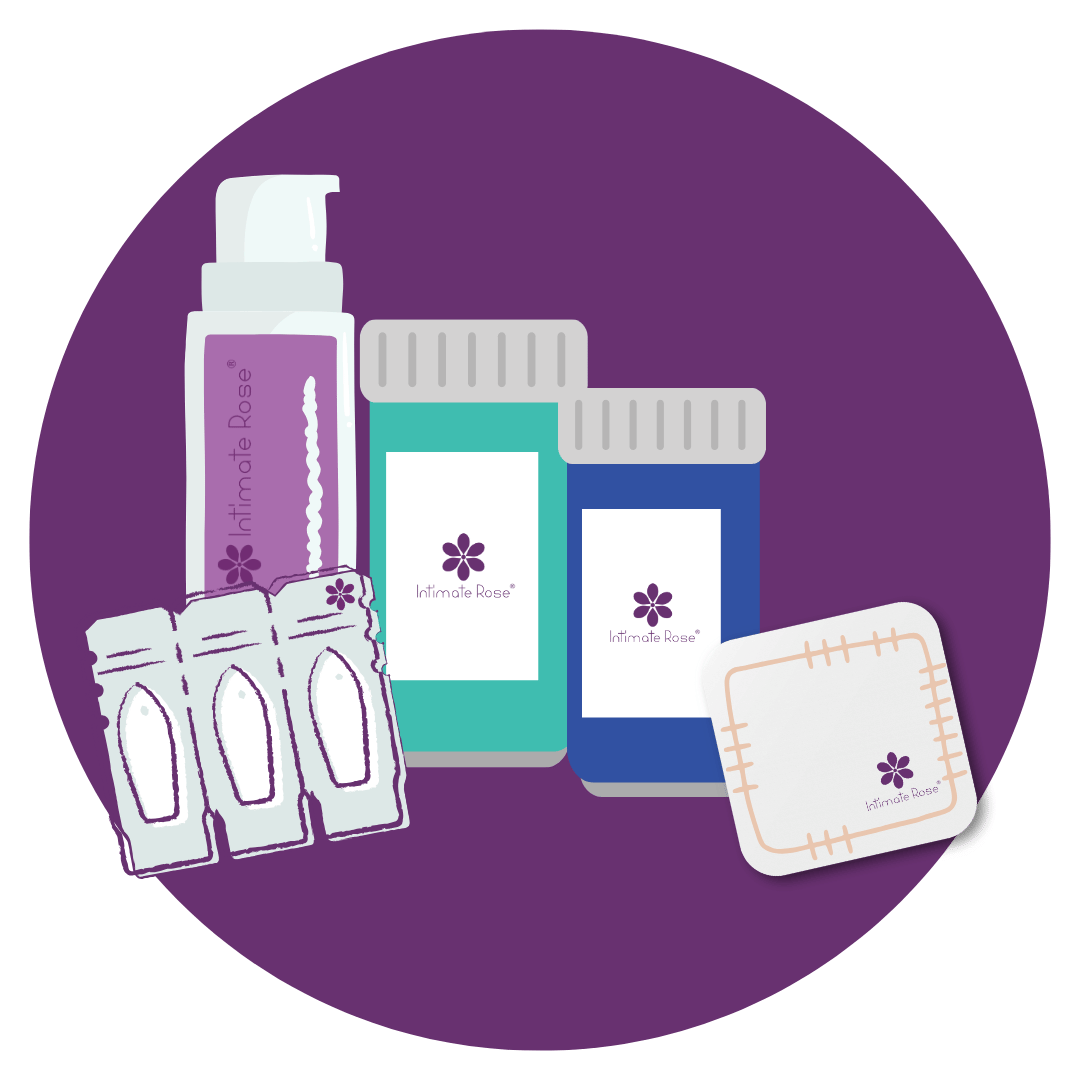
Phytoestrogens
In comparison to the synthetic, animal-derived estrogen in traditional hormone therapy, phytoestrogens are plant-based, natural, and safely treat the symptoms of menopause with no side effects. Vitex Agnus Cactus, also known as Chasteberry, is a powerful phytoestrogen that mimics the effects of estrogen in the body and promotes hormone balance to alleviate the symptoms of PMS and menopause.
Intimate Rose added ginger root to their Vitex Chasteberry supplements to prevent the nausea that can sometimes occur with hormone-balancing supplements.
Antibiotics
Although antibiotics are often prescribed to treat bacterial UTIs, they are not always required depending on what causes the infection and how soon it is treated. Unfortunately, taking antibiotics for a UTI can destroy beneficial and harmful bacteria, which often contributes to recurring UTIs or an ensuing yeast infection.
Probiotics
Despite their ability to kill harmful bacteria like E. coli, antibiotics also destroy friendly bacteria like lactobacilli. When the vaginal microbiome is weak after a course of antibiotics, UTIs can easily reoccur. However, this can be prevented by taking a daily probiotic containing lactobacilli, such as Flora Bloom Feminine Probiotics.
Known for their benefits in improving gut health, probiotics are also helpful to restore and maintain a healthy vaginal microbiome. A daily probiotic can not only restore a healthy balance of beneficial and harmful bacteria after a UTI but a regular intake will also prevent future UTIs.
Treating UTIs During Menopause Without Antibiotics
To avoid the adverse effects of antibiotics, the following natural methods of treating UTIs are typically effective within 1-3 days. Although rare when taking these powerful remedies, a lack of improvement within 3 days should be discussed with a doctor.
It is important to note that estrogen therapy or phytoestrogens are recommended in conjunction with these natural remedies to prevent UTIs during menopause.
Aloe Vera Supplements with added D-mannose & Calcium
This fast-acting blend of natural supplements provides quick relief from UTI symptoms, particularly the frequent urge to pee and the burning sensation when urinating. In fact, several studies have shown that aloe vera reduces bladder pain, urinary frequency, urgency, and urethral burning by as much as 92%.
The added calcium in the Aloe Vera Supplement from Intimate Rose establishes the perfect pH levels for aloe vera to do its work. And D-mannose, a type of natural sugar found in many fruits, prevents harmful bacteria from sticking to the urinary tract. For menopausal women prone to recurring UTIs, these supplements are safe to take long-term.
Drink Water
Although it may seem counteractive given the frequent urge to urinate with UTIs, drinking at least 2.5 liters of water daily will help flush harmful bacteria and any urinary tract irritants from the body.
Give Sex a Break
Sex increases the risk of harmful bacteria spreading to the urethra so it’s a good idea to refrain from intercourse until UTIs have been fully treated.
Avoid Irritating Drinks & Foods
Alcohol, carbonated drinks, and the caffeine in tea and coffee can further irritate the bladder during a UTI so they are best avoided during treatment. Acidic, citrus-based, and spicy foods are known to have similar effects and are best avoided too.
How to Prevent UTIs During Menopause
During perimenopause and menopause, 55% of women are known to experience not one but recurring UTIs. Although primarily caused by the effects of low estrogen levels on vaginal health, some lifestyle habits can also contribute.
In addition to taking estrogen therapy or the natural alternative known as phytoestrogens to improve vaginal health, the following tips also help.
- Drink 2.0-2.5 liters of water per day to flush any harmful toxins & bacteria from the body
- Always wipe from front to back after using the toilet to prevent the spread of harmful bacteria from the anus or rectum
- Due to the A-type proanthocyanidins (PACs) in cranberries, drinking 500ml of unsweetened cranberry juice daily can prevent harmful bacteria from adhering to the urinary tract. It’s important to note, however, that drinking unsweetened cranberry juice will not help treat UTIs or cystitis once they’ve started
- When urinating, take time to empty the bladder to prevent any harmful bacteria from sticking to the urinary tract
- Avoid using spermicides as a form of contraception to prevent allergic reactions, pH imbalances, and bladder inflammation
- Don’t douche or use fragranced hygiene products around or in the vagina to prevent irritation and maintain a healthy vaginal pH balance
- Always urinate after sex to flush any harmful bacteria that could have entered the urethra
- Wash the vagina daily, and after sex, with warm water (unscented soap is optional)
- Take showers instead of baths
- If you suffer from recurring UTIs or cystitis, consider a daily probiotic and an aloe vera supplement with added D-mannose and calcium for improved bladder health.

Get your personalized HRT plan!

Get your personalized HRT plan!
Conclusion
UTIs during perimenopause and menopause are common due to the effects of declining estrogen on the vagina and bladder. Although antibiotics are normally recommended as treatment, they often contribute to the recurrence of UTIs due to their impact on the vaginal microbiome.
To successfully treat UTIs during menopause, speak with your healthcare provider about the benefits of probiotics, and aloe vera supplements with added calcium and D-mannose.
Treating UTIs early is key to preventing recurring UTIs and more serious kidney infections. If you experience severe back pain, nausea, or vomiting with a UTI schedule an appointment with your healthcare provider immediately.
References
Urology Care Foundation – Urinary Tract Infections in Adults - https://www.urologyhealth.org/urology-a-z/u/urinary-tract-infections-in-adults
Mayo Clinic – The Female Urinary System - https://www.mayoclinic.org/female-urinary-system/img-20006848
National Library of Medicine - The Vaginal Microbiota and Urinary Tract Infection - https://www.ncbi.nlm.nih.gov/pmc/articles/PMC5746606/
National Institute on Aging – Menopause - https://www.nia.nih.gov/health/menopause/what-menopause
Johns Hopkins Medicine – Genitourinary Syndrome of Menopause - https://www.hopkinsmedicine.org/health/conditions-and-diseases/genitourinary-syndrome-of-menopause
National Library of Medicine - Preventing urinary tract infections after menopause without antibiotics - https://pubmed.ncbi.nlm.nih.gov/28364867/
National Library of Medicine - Recurrent urinary tract infections in women: How promising is the use of probiotics? - https://pubmed.ncbi.nlm.nih.gov/29063878/
National Library of Biotechnology - Efficacy of phytoestrogens for menopausal symptoms: a meta-analysis and systematic review - https://www.ncbi.nlm.nih.gov/pmc/articles/PMC4389700/

Get your personalized HRT plan!





